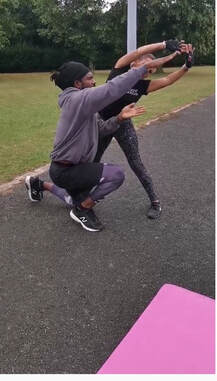 The six components of motor skills related to fitness are agility, balance, coordination, power, reaction time and speed. Motor skills are associated with muscle activity, motor skills are carried out when your brain, nervous system and muscles work in concert to move parts of your body in large or small manoeuvres. Brain Mackenzie-Performance Coach Motor skills are improving with practice and all six components determine your level of athletic ability. A well-rounded athlete works to improve each of the six equally. Working on gross motor skills helps anyone gain strength and confidence in his/her body. It also helps them get exercise and physical activity, which is important for a healthy lifestyle. Developing these skills can help your ability to do more complex skills in future activities, jumping over a hurdle or changing in direction while going a full speed, without injuring yourself or falling over. Ritchie Cephus-High Performance Coach Conclusion Although it can take a long time to develop fine motor skills, it can be beneficial to seriously dedicate this time for certain athletes. Among elite athletics, the differences between first and last place are often incredibly small. Since these athletes are very advanced in their ability to move the way their sport demands, fine motor development may be a key factor in giving them the edge to win. But knowing when, and how often to incorporate fine motor skill development into training is based on the coach’s knowledge to know their athletes’ abilities. If a coach doesn’t know what to look for or implement, talk with other successful coaches. Research what others have done and develop a system that works for you, working general to specific, to develop your athletes by progressing them appropriately to meet the motor demands of their sport. Tony Kauth University of Wisconsin-La Crosse Balance Balance is the ability to stabilise your body, whether standing still or maintaining motion. Ice-skating, skiing and bicycle riding are balance exercises. There are two types of balance – static and dynamic. Static balance refers to remaining upright while staying still, standing on one leg, for example. Dynamic balance deals with stability in motion. Test your balance by holding a stationary position if you can, without wobbling, after moving around, plyometrics are good example of improving your balance Coordination Coordination describes the synchronisation of your senses and your body parts in a way that enhances motor skills. A variety of tests measure coordination, including hop from one leg to another or even as simple as doing an Amarch where you need to coordinate opposite hands and legs. Agility Agility is the capacity to change course, controlling the direction and position of your body while maintaining your momentum. Changing course while sprinting e.g. leaping over hurdles. Speed Speed is the facility to move your body swiftly. Speed is usually associated with running, but speed can be any other exercises, like throwing or kicking a ball, depend on moving your arms or legs rapidly, how you would measure speed would totally depend on the type of sport you are into. Power Power is a combination of speed and muscular force. A rugby player might use power to blast through a line of men. A gymnast uses power during a performance on the rings and uneven bars. The best way to measure your power is by throwing a heavy object such as a med ball or lifting weights in the strengthened train range max power. Reaction Time Reaction time measures how swiftly you interpret and then react to expected and unexpected events happening around you. An example of reaction time to an expected event is the interim between hearing the starter's pistol and beginning to run. you can practise your reaction time by doing several things, one drill we used at tranquillity 360 fitness octagon cone drill where our coaches would call out colour of the cone and the athlete would sprint to it and back to ready position.
0 Comments
Leave a Reply. |
AuthorsThis blog is updated by Tranquillity 360 fitness personal trainers, as well as other guest bloggers. Archives
July 2021
Categories |

 RSS Feed
RSS Feed